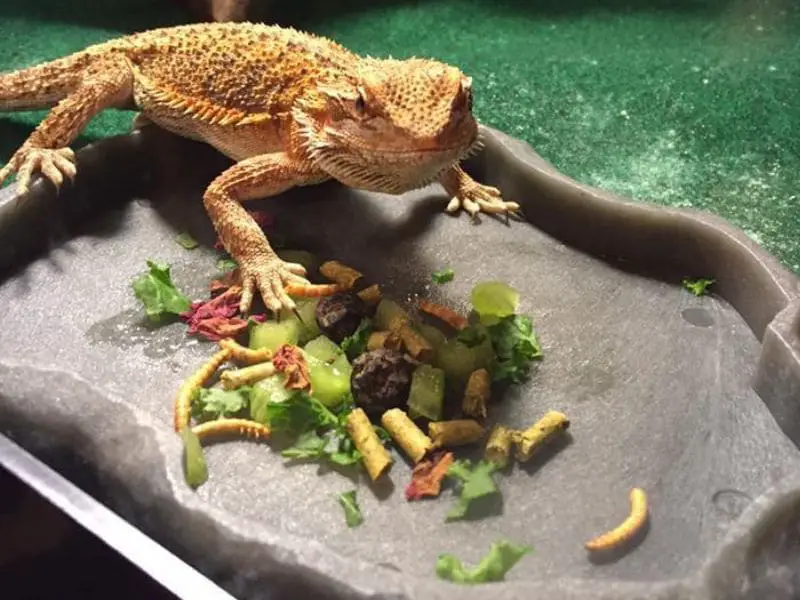Mealworms can be a delicious treat for your bearded dragon. When your beardies reach the juvenile stage (5 to 18 months), it is safe to feed them mealworms. Despite the nutritional benefits of mealworms, it is highly recommended that you regulate the number of mealworms you offer your bearded dragon to avoid creating obesity and appetite problems in your reptile pet.
Mealworms should form a tiny part of your beardie’s diet. These worms must be balanced out with fruits, vegetables, and other yummy insects.
Can bearded dragons eat mealworms?

You can feed mealworms to bearded dragons but due to their high-fat content, they’re best used as a treat rather than the main meal. To prevent excessive weight gain in bearded dragons and choking, they should start eating mealworms at the age of 8 months.
Bearded dragons can eat mealworms in various forms:
- Freeze-dried or canned mealworms (dead ones)
- Live mealworms
Most beardies will recognize and appreciate live mealworms. They love live mealworms because they accurately represent what beardies hunt and feed on in their natural habitats.
How many mealworms to feed a bearded dragon
Adult bearded dragons should eat 5 to 6 mealworms in a single feeding session but only once a week. They should be fed more vegetables, which is why you can reduce the number of times you feed them mealworms and other fatty treats.
For baby bearded dragons, provide a maximum of two mealworms 1-2 times a week and use them only as a treat rather than the main meal. Once your bearded dragon is over 18 months, its digestibility of mealworms is improved.
Bearded dragons love mealworms, but that does not mean you should feed them as many as they want. Only start giving mealworms as a treat when your beardies are five months and over. Baby beardies can suffer intestinal blockage, impaction, and even death in most cases.
Large amounts of mealworms in a beardies diet can lead to obesity. However, if your bearded dragon is pregnant, you can spoil her by increasing the number of worms by just a bit as their bodies demand more food than usual.
If your beardie is not eating mealworms, Try mixing mealworms with veggies and other insects that your beardie loves. If these don’t work, consider visiting the vet.
READ ALSO: Can Bearded Dragons Eat Arugula? Benefits and Dangers
Can bearded dragons eat mealworm beetles?
Yes, you can feed mealworm beetles to your bearded dragon. Mealworm beetles are the last stage in the life cycle of mealworms. Unlike mealworms, which contain a lot of fat and little protein, mealworm beetles contain a lot of protein and little fat.
Therefore it is highly recommended that you feed beardies mealworm beetles compared to mealworms. Due to the size of these beetles, only adult bearded dragons should be allowed to enjoy this delicacy.
The crunchiness of the mealworm beetles makes them more palatable to beardies, and they love their texture. Mealworm beetles also provide the thrill of capturing and eating to beardies. The chase mimics a bearded dragon’s natural food capture method.
However, if the dragon does not like the taste of mealworm beetles, avoid force-feeding.
Benefits of Mealworms for Beardies
When looking for the best diet for your bearded dragon, there are a lot of factors you need to consider. It is essential to ensure you offer your beardie the best there is for good health and quality of life.
Mealworms can have remarkable positive impacts when offered to beardies in the right amount. Here is a table highlighting the nutritional composition of mealworms.
| Nutrients | Live Mealworms | DriedMealworms |
| Proteins | 20% | 53% |
| Fat | 13% | 28% |
| Fibre | 2% | 6% |
| Moisture | 62% | 5% |
| Calcium | 133mg/100mg |
We have explained the various nutritional benefits below.
1. Mealworms are rich in moisture
Beardies are typically desert animals. They do not need large amounts of water to survive. However, they get most of their water content from vegetables and foods such as mealworms. Your beardies will be adequately hydrated because mealworms contain 62% water.
2. High protein Levels.
Protein aids in the growth of bearded dragons. When they are younger, they need more of it and thus may exhibit a high appetite for insects.
Proteins are typically made up of amino acid chains and act as vital building blocks for bearded dragons. Proteins are particularly crucial when developing muscles, antibodies, and enzymes, especially in juvenile bearded dragons.
The amount of protein your bearded dragon consumes in its early stages of life determines its ultimate full size. Therefore, selecting mealworms for their protein content is the right decision.
3. Mealworms are a great source of fat.
Fat in mealworms directly contributes to energy production for beardies. While too much fat may cause obesity, a balanced amount helps bearded dragons to stay active. The more active they are, the leaner they get – due to exercise.
Lack of fat content in foods can lead to underweight bearded dragons, lethargy and a lack of motivation for beardies to move around their environment.
4. Source of calcium for bearded dragons – 13.3mg/100mg
Dietary calcium is important to the growth of your pet. Mealworms are a great source of calcium for bearded dragons. Mealworms pack 13.33 mg of calcium which is not enough for your beardie so you should boost the supplement to avoid calcium deficiency.
Calcium helps bearded dragons to maintain healthy bones and muscles. Calcium deficiency in the diet of bearded dragons can cause the following:
- Muscle twitching
- Swelling of the legs
- Bones become fragile
More adverse effects of calcium deficiency on bearded dragon are permanent deformities in their limbs, jaw, spine or tail. Having deformities means that your bearded dragon will be stagnant. Stagnation means that they will not have free access to food and water.
Considerations and Precautions
When incorporating mealworms into your beardie’s diet, you must observe moderation because they contain a lot of fat and phosphor compared to their calcium and protein content. High phosphor levels restrict calcium absorption for bearded dragons. In extreme cases, your beardie may suffer from bone diseases, specifically metabolic bone disease.
If your beardie eats too many mealworms, the excessive fat might be hard to lose. Unlike bearded dragons in the wild, domesticated beardies don’t get much exercise.
Additionally, those who keep bearded dragons are used to feeding them feeder insects daily, which is a problem on its own.
Pro tip: Most pet reptiles can get addicted to mealworms and refuse to eat anything else because they are very delicious. That’s why it is recommended that you only use them as a bonding treat as opposed to daily food for your bearded dragons.
Your beardies’ diet should consist more of greens than meats.
Reasons for the popularity of mealworms include:
- They are cheap –Mealworms are very affordable compared to other commercial feeder insects. About 5000 medium size mealworms cost less than $40.
- You can raise and maintain mealworms at home– As long as you have the following, you can raise mealworms for your beardies. It will be easy to keep the worms alive during breeding. They include:
- A proper-sized container
- Means of maintaining optimum temperature (between 70-80 degrees Fahrenheit)
- Substrate
- Vegetables
- Mealworms are large – The fact that these delicious worms are large means that most pets will eat only a few, and they are full.
READ NEXT: Dubia Roaches for Bearded Dragons: Nutrition Value and Amount

